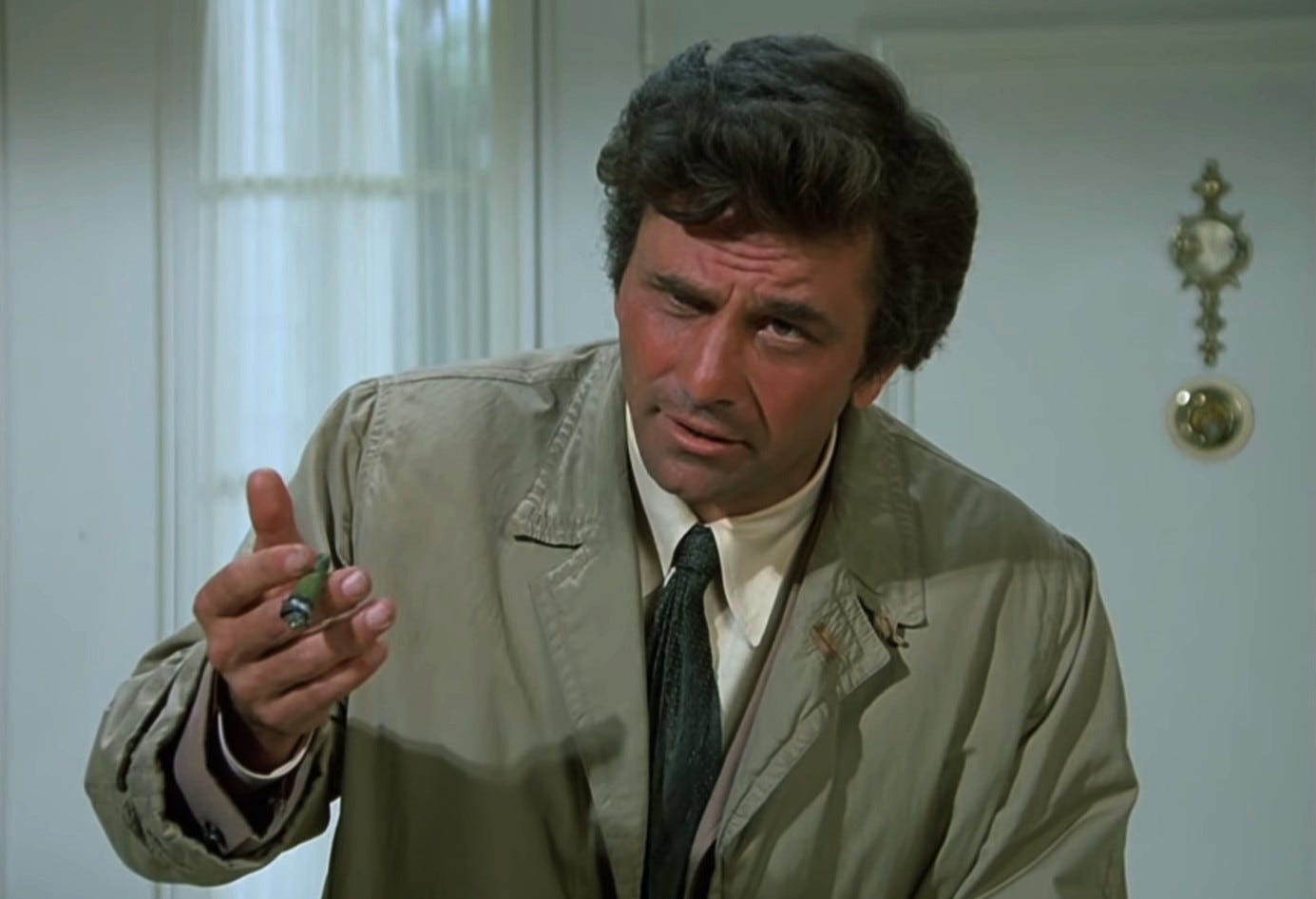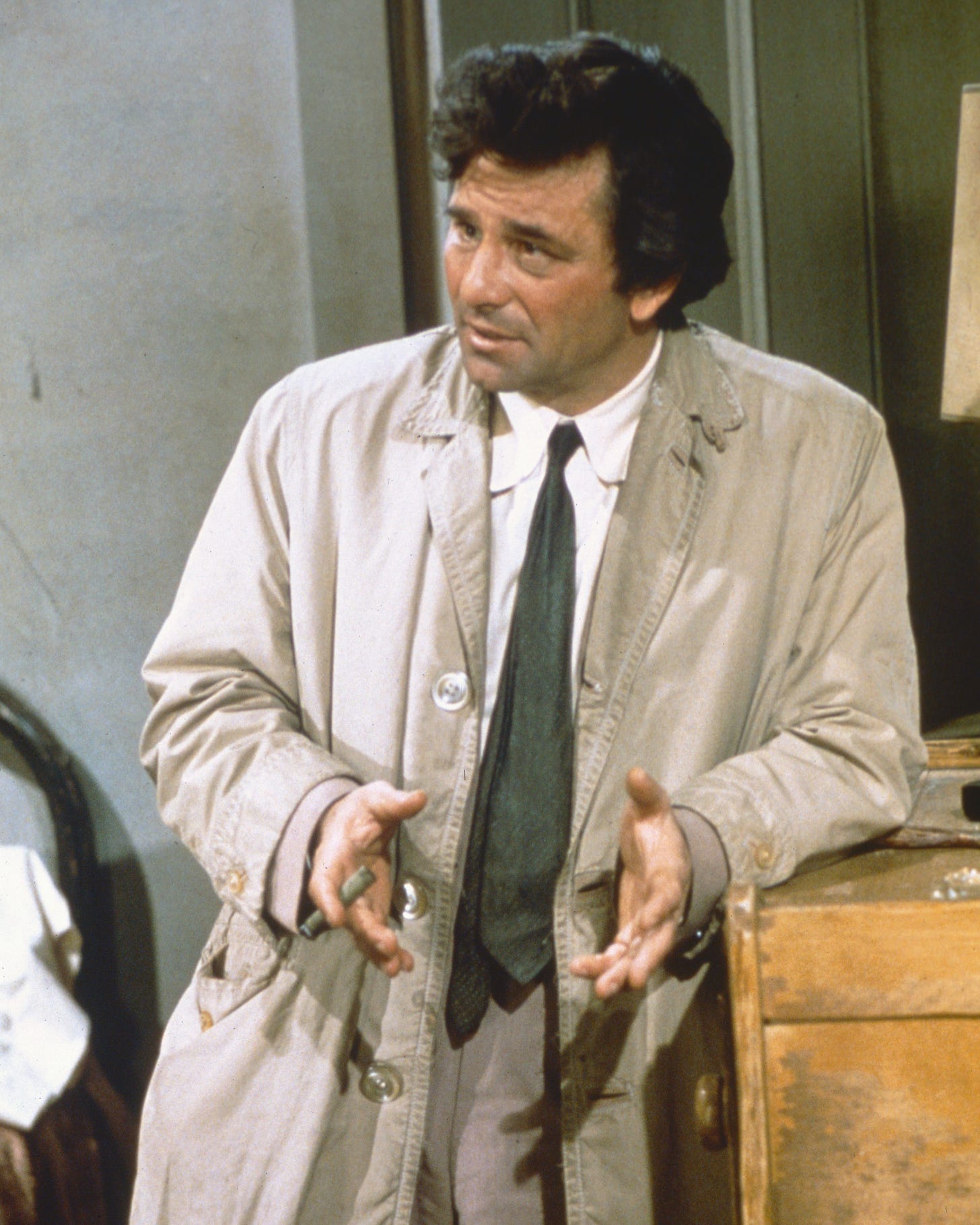Columbo Is Mistaken for a Homeless Guy (from the old show in the 70s and beyond)
By Stephen Wilson, one of our reporters abroad
Note: “Columbo” was a detective who was known for his old overcoat and his unconventional ways of investigating crimes. For a great explanation of the character and the show, see this page: Columbo - Wikipedia
.
There is one unforgettable and amusing scene from the detective serial, 'A Negative Reaction,' an episode in 1974, we see the legendary detective Columbo, who is investigating a faked kidnapping and murder of a photographer's wife. Columbo drops into the Saint Mathew's Mission which has a center which helps the homeless. His aim is to follow up a potential homeless witness to the murder. However, due to his rough and unkempt appearance, the nun {played by Joyce van Patten} mistakes him for being a homeless person. She insists he sit down and eat and throw away his beloved coat. Columbo finds himself in an awkward situation, but as usual, tactfully talks his way out of it.
StreetSense looked into this marvelous episode which can be hilarious. BTW--the full scene can be watched on youtube.com via the Internet.
A nun notices Lieutenant Columbo entering the dining room and says, “Welcome brother! Peace be with you. My house is yours.”
Columbo replies, “Thanks.”
Nun: “You are hungry and tired; I can see this. George, would you bring a plate of beef stew soup. Would you join us brother?'
Columbo: “Join you for what?”
The nun insists he sits down and eat, and reassures him not to feel ashamed as “A man is not judged by the size of his purse” to which Columbo agrees.
The nun looks at the coat and says, “'Tch, tch, tch! That coat, that coat! Oh I 'm sure that we can find something nicer for you in the other room. Something may be a bit warmer? What size are you? Do you know your size? Size 36?”
Columbo : “I think there's a misunderstanding.”
Nun: “Oh no, brother. No false pride between friends. We are in luck we have found you a tweed coat that had hardly been used.”
Columbo: “'Look I appreciate your help. I 've had this coat for 7 years; I'm very fond of it.”
Nun: “Oh, your poor man.”
Columbo finally admits he is a police detective working on a case. The nun is very impressed and tells Columbo “How clever you are! I would never have guessed. I won't tell a soul about your disguise!”
When he interviews the homeless man who turns out to a highly educated, refined, and witty aristocrat called Dolan {played by Vito Scotti} who has fallen on hard times, it is all in vain. Dolan can't remember a thing about hearing shots at the murder scene because he was 'blind drunk.'
The scene is quite poignant. A nun doing her best to make someone feel at home and assisting him when she is actually embarrassing and making him feel uncomfortable instead. The droll thing is that Columbo's coat is not a disguise or a ruse to make suspects relax their guard but genuine. He really adores this coat! And in contract to his colleagues, Columbo insists the homeless person be treated with respect and seriously interviewed as a potential witness.
It is interesting to note that though the character of Lieutenant Columbo was partly based on the investigator Porfiry from Dostoyevsky's novel “Crime and Punishment,” he also claimed that he brought some of his own personality into the role. For instance, Peter Falk stated he didn't care much about his appearance, was a bit of slob but was also, like the detective, a bit of an obsessive who liked to pursue a goal to the very end. He was also a bit absent-minded and forgot things because his mind was so focused on his work.
“So it was easy for me to spot another obsessive like Columbo. At first blush he appears likeable, easygoing, nonthreatening; but for me, Peter, I saw a part of Columbo that was like part of me. I saw a man who had an obsessive streak. I saw that behind the raincoat was someone who couldn't sleep until he found the answer.”
Falk goes on to say, “Faye Dunaway, in a script written by yours truly, asked Columbo what was the longest he'd ever worked on a case. He answered 11 years. It took 132 months, but finally it was over. He found the answer”' {page 136 of “One More Thing: Stories from My Life,” by Peter Falk, 2008, London: Random House}.
Life often imitates art or vice versa. Peter Falk was often turned away by security men of the homes of celebrities who had invited him as a guest. They presumed he was a homeless person in real life!
Of course, Columbo 's method is certainly to pretend to be dumb by often chatting on irrelevant subjects like how bad he is at photography, about his broken-hearted dog who won't eat anything because he has fallen in love with another dog whose owner moved out with the dog—and the habits of his wife we never see. The aim is to lull suspects into a relaxed state of mind where they are more likely to inadvertently reveal some clues. For example, when Columbo is about to produce a paper with real evidence written on it before the suspect, he takes out a piece of paper from his coat pocket which reads 'a loaf of bread and a box of raisons.' It is his wife's reminder of what he must buy before he comes back home.
So the suspect immediately thinks Lieutenant Columbo is too stupid to be a real detective. So Columbo's sharp and penetrating analysis is concealed by his chaotic, untidy and unkempt appearance. If he can't even keep up appearances, then how can he catch criminals? The man can't organize himself never mind launch an effective investigation. So they badly underestimate him. But you should never underestimate your opponent in any area. That also goes for sport. My late friend who won competitions at chess told me “You should never underestimate anyone you play at chess!”
But is there really anything novel about Columbo's methods? In what way does he resemble Porfiry in Dostovesky's “Crime and Punishment?” Well Porfiry, like Columbo, annoyed the suspects with his idle chatter about how he can't give up smoking or the furniture in his room.
It worth quoting the following from the novel:
“ ‘Tell me, please,' he asked suddenly, looking almost insolently at him and taking a kind of pleasure in his own insolence. 'I believe it's a sort of legal rule—a sort of legal tradition—for all investigating lawyers to begin with attack from afar, with a trivial, or at least an irrelevant subject, so as to encourage, or, rather, to divert the man they are cross-examining to disarm his caution and then all at once to give him a knockout blow with some fatal question. Isn't that so? It's a sacred tradition, mentioned, I fancy, in all the manuals so far? Yes, yes,... why, do you imagine that was why I spoke about government quarters...eh?' “ {pages 284-285, “Crime and Punishment,” by Fyodor Dostoevsky, 2000, translation by Constance Garnett, Ware, Hertfordshire, England: Wordsworth Classics}.
Of course, you might find the notion of Columbo's coat unconvincing. How does he wear this coat for 365 days a year especially in very warm weather?
The other mystery is why his wife does not manage to bin his coat while he is sleeping? Perhaps his wife does not want to needlessly upset Columbo. In some situations, a lot of women, like the nun, would try and persuade him to wear a more presentable suit.
Once a Russian student told me how her mother would insist her father “Could not go out wearing some clothes because she looked like a homeless person.” You often hear this refrain with the words “You mustn't wear this because only the homeless dress like this.” But in reality, it is not always easy to spot a homeless person by his attire. After all, the nun thought that Columbo's coat was just an elaborate disguise when---in fact—it wasn't.
The character of Columbo is very polite. His speech is peppered by 'Yes sir,' or 'Madam', ‘thank you very much' and 'I beg your pardon sir.' Why is this the case? Peter Falk simply says that “It felt right” and left it at that.
But we won't leave it at that. Columbo is polite because he respects people no matter what their station or status in life. Like the nun, he respects the homeless and treats them as an equal. In the scene when he is talking to the homeless man Dolan, Dolan claims he is seeing him at his worst. Columbo replies, “I'm not at my best today either.”
Perhaps like Simenon's French detective Maigret, Columbo's motto is to 'understand and judge not.'




